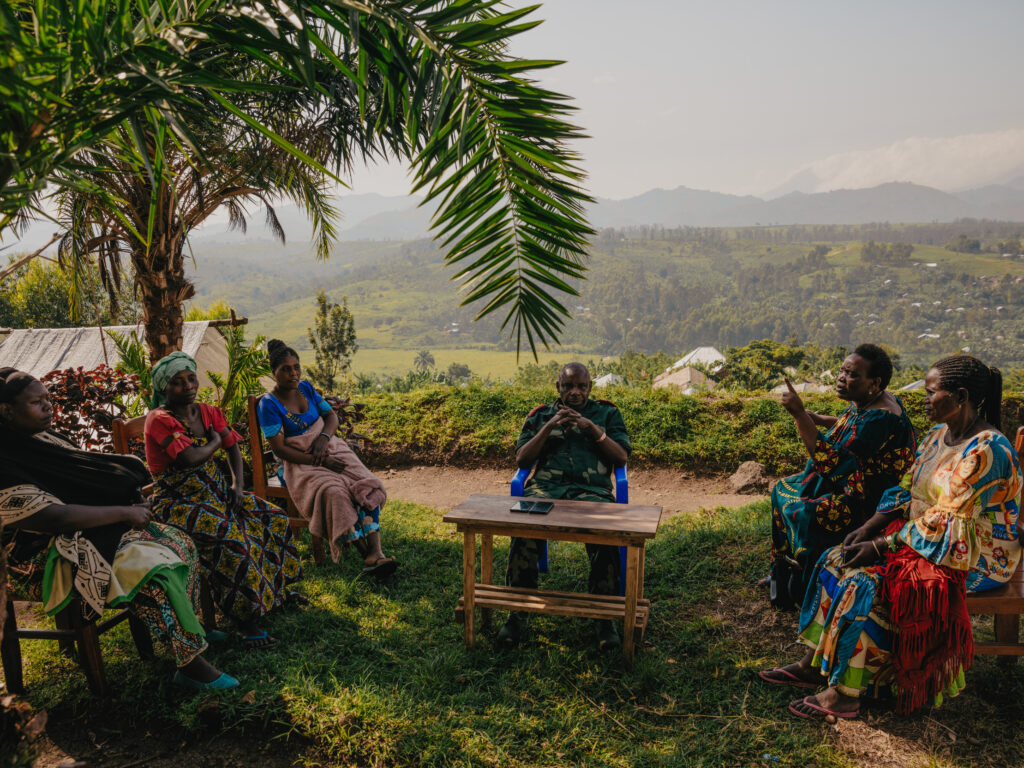
Led by peace activist Liberata Buratwa, displaced women Sophie, Concelata, Genereuse and Elizabeth meet with Congolese army General Peter Cirimwami, commander of operations against the M23 rebel group. The dialogue was intended to amplify the voices of women displaced by a wave of heavy fighting with M23, and lobby for increased protection for civilians in the area.
Hugh Kinsella Cunningham: Rutshuru, Rutshuru Territory, North Kivu Province, DRC, May 31st 2022.
Speaking truth to power
On the frontlines of the M23 conflict, in Rutshuru territory, peace activist Liberata Buratwa leads a delegation of displaced women to meet with the Congolese general in charge of operations against the rebels in the zone. She asked that the military respect civilian rights in the area, and lamented that little was being done to protect displacement camps from a wave of fighting. The fighting between the Congolese army and M23 is large-scale, with both sides utilising heavy weaponry such as rocket artillery and mortars. Civilians can be caught in shelling, trapped behind shifting frontlines. I have even spoken to several civilians who claim that the frantic passage of military convoys has knocked down and killed individuals on roads.
The image is part of a story that follows the work of the women’s peace movement in the Democratic Republic of Congo. As conflict spirals out of control across multiple provinces, these activists are some of the only individuals working to protect their communities from the worst of the violence. Liberata, with 20 years of experience, is one of the few people in the province with the social cache to directly engage with the power of the military hierarchy. In a previous war, she negotiated a ceasefire with CNDP rebel General Laurent Nkunda, telling him: ‘My son, rebellion will lead you nowhere; the bush is for animals, not for people’.
This photographic project focuses on people undertaking acts of bravery for the good of their community. Challenging military authority and speaking ‘truth to power’ is rare and these meetings between soldiers and civilians are fraught with tension. Practically, creating images such as this one is only possible with long-term storytelling. Access is contingent on establishing trust with contact, knowledge of which local figures to shadow, and how to be at the right place at the right time, all of which comes with years of experience and a lot of preparation.
Hugh Kinsella Cunningham
The story behind the photograph
One morning in late May 2022, the people of Rutshuru once again woke to the blasts of rockets and mortars after M23 rebels attacked the area. Under seasonal rains, thousands of civilians fled to safety carrying children, cooking pans, goats, mattresses. Columns of Congolese Army tanks sent from Goma charged in the opposite direction. They were followed by flocks of motorcycle taxi drivers cheering support.
“Here insecurity is a cycle,” says Buratwa, adding that, while the rebels continue with their attacks, she is “not intimidated” by the growing violence. “I have been working for peace since I was very young.”
During the turmoil, Buratwa rushed to where hundreds of families scrambled to seek shelter at churches, schools, even a football stadium. Gathering a crowd to her, she asked the newly arrived families which roads they had used to flee, where the most intense fighting was taking place, and which communities were missing family members. Information sharing is a central part of activists’ work. Testimony from the ground is the only tool they have to assess the security situation and help families make decisions about whether to return home.
“Every time we start harvesting the war starts again!” a disgruntled woman complained to Buratwa. “The rebels will be pillaging our fields right now.”
Days later, Buratwa and four displaced women obtained a meeting with General Peter Cirimwami, who commanded the fight against the M23 in Rutshuru to advocate for soldiers to protect civilians and to be held accountable for their actions during operations.
Soldiers sometimes carry out exactions against communities they suspect of harboring rebels. The places where civilians seek refuge are not safe either.
At the army headquarters, the general was holding court under a palm tree. Behind him, the frontline was in sight. “General father, we suffer,” the women told Cirimwami. “We sleep on the floor. We want war to end, the area must be secured.”
“Dear mothers, you came to cry for peace,” Cirimwami responded, wagging his finger. “But these rebels, they are your husbands and they are your sons.”
“General, the rebels dress as civilians,” Buratwa replied, holding the general’s gaze. “But we know who is who. We can work together if you keep the displacement sites safe.”
Collaboration between women’s groups and the authorities has historically been difficult, says Nelly Mbangu, a lawyer from Goma. This is, she explains, because patriarchal culture is deeply entrenched in Congo. Women are expected to obey men, never disagree or complain, and they are not allowed to voice their opinions publicly. Those who do often face backlash in the form of threats, harassment, exile, even death.
Such customs make it challenging for women to take on leadership roles and speak up about the violence they endure, let alone spearhead the search for solutions. Yet their efforts are slowly making an impact.
Bahati, S., Maubert, C. & Kinsella Cunningham, H. (2022) ‘These women are bringing some peace to war-stricken Congo’, https://www.nationalgeographic.com/culture/article/these-women-are-bringing-some-peace-to-war-stricken-congo.